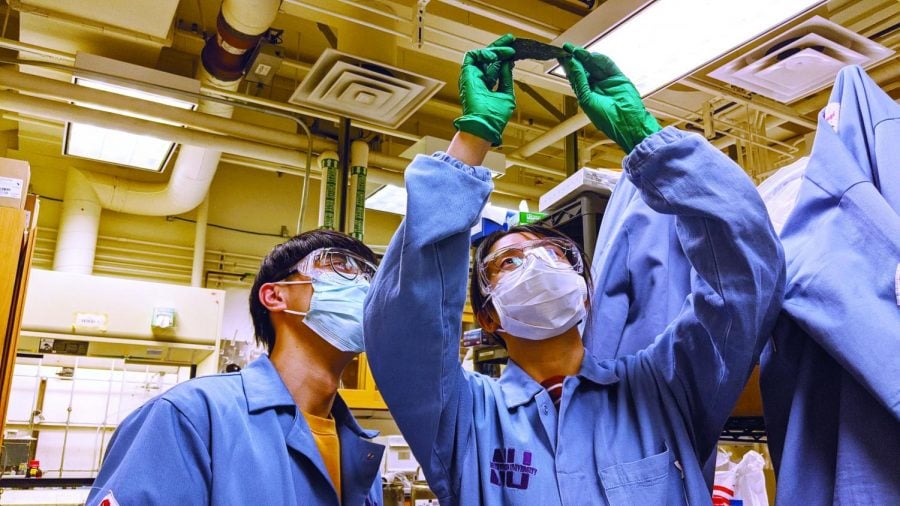NU researchers design antiviral face mask fabric to combat COVID-19
McCormick Prof. Jiaxing Huang’s research team simulated sneezes and coughs to investigate the effect of a chemical coating on mask-like fabrics.
November 8, 2020
A team of NU researchers found that face masks treated with antiviral agents may reduce the infectiousness of the wearer.
This discovery, published in a materials science journal, could help combat the spread of COVID-19. The group received a Rapid Response Research grant from the National Science Foundation in March to support their work.
The October 29 study found that droplets resulting from simulated sneezes and coughs were significantly modified when they came into contact with fabric coated with chemicals known to deactivate viruses.
McCormick Prof. Jiaxing Huang, who led the research group, said the three elements of infectious diseases are the source, the transmission pathway and the people most susceptible to infection. The mask designs, he said, are so effective because they directly address the source and complicate the virus’s path toward infecting others.
Jiaxing Huang said although the team only developed a proof of concept rather than a product, the experiments emphasized the importance of face masks as protection for everyone. Masks should no longer be thought of as personal protection equipment, he said.
“You hear people saying, ‘I don’t need a mask, it’s my choice. I don’t need protection,’” he said. “But I think there’s a gross misunderstanding. A mask is really public health equipment during a pandemic.”
The mask designs have the added potential to protect others by attacking the virus rather than simply containing it, said materials science and engineering graduate student Yihan Liu. The team, he said, also wanted to make face masks more accessible with their research.
“Our initial thought was if we can develop a way for people who (are) in their own home and cannot find a way to buy their surgical masks to make their own masks with their household materials like gauze,” Liu said. “All the materials we used were actually pretty easy to obtain, even during the pandemic.”
Ph.D. candidate Haiyue Huang said although NU had closed many of its buildings due to the pandemic, researchers conducting COVID-19 studies were granted access to facilities in order to execute their projects.
The feeling of working on a deserted campus was unusual, Haiyue Huang said.
“When the whole campus is empty, that gives us some mental stress,” Haiyue Huang said. “It’s a little bit lonely, working in a lab.”
Jiaxing Huang, who is currently studying the transmission pathway of COVID-19 with a focus on self-sanitizing surfaces, said he wants the study to show others the importance of taking COVID-19 seriously.
“The virus is not scary, but we are going to mess up if we don’t deal with it,” Jiaxing Huang said. “Knowledge empowers you, right? If you get to know this virus better, then things make sense. In a way, that’s what we also hope to do with this paper.”
Email: [email protected]
Twitter: @rjleung7
Related Stories:
— Northwestern Prof. Jiaxing Huang receives NSF RAPID grant to develop antivirus barrier
— Masks become social norm, safety expectation on Evanston campus
— Face masks 411: When to wear and where to buy in Evanston


